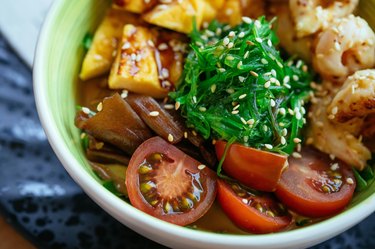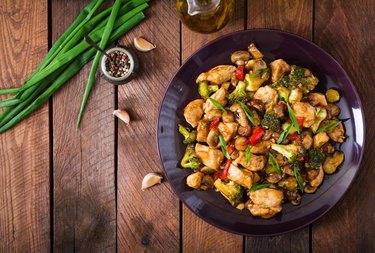
If you're trying to up your intake of leafy plants, you might want to look to the ocean.
Sea vegetables like seaweed and other edible aquatic plants like nori, kombu, dulse and sea moss are touted as a sustainable source of protein and nutrition. And they have a unique umami flavor you won't find from most plants grown on land. Best of all, they're easy to incorporate into meals like salads, soups, grain bowls and even dips.
Video of the Day
Video of the Day
Here's the breakdown on the potential benefits and risks of sea veggies, the different types to know and tips on how and where to buy them.
Are Sea Vegetables Like Seaweed Healthy?
Like leafy greens that grow on land, seaweed is generally good for you, as sea vegetables are packed with nutrients but contain relatively few calories.
"They're a good addition to any diet. Adding in a bit of seaweed is a great way to get a ton of nutrition in a small package," says Ana Reisdorf, RD, a registered dietitian and founder of The Food Trends.
Here are some of the reasons why:
- High in vitamins and minerals. Sea vegetables can serve up a dose of vitamins A, B12, C and D, along with minerals like iron and iodine, per a March 2019 Nutrition Reviews article. That makes them a top-notch choice for supporting thyroid health, bone health and overall wellness, says Gillean Barkyoumb, RDN, a registered dietitian with Plexus Worldwide.
- Gut health-friendly. You'll find a few grams of fiber in each helping of sea vegetables, Barkyoumb notes. That's good for your microbiome, because fiber helps feed the "good" bacteria in your gut, per the Cleveland Clinic.
- Rich in antioxidants. Seaweed has polyphenol compounds aplenty, which may have cancer-fighting, cholesterol-lowering and blood sugar-regulating effects, per the Nutrition Reviews article.
Health Risks to Consider
While seaweed comes with a lot of nutritional pros, there are a few cons you'll want to know about.
First, seaweed is very high in iodine. While the mineral is essential for healthy thyroid function, too much can have the opposite effect, potentially causing your thyroid to slow down or speed up, according to a June 2019 paper in the Annals of the New York Academy of Sciences. So don't overdo it, Reisdorf says.
It's also a good idea to check with your doctor about eating seaweed if you have an existing thyroid problem. In that case, you may need to limit your intake.
Seaweed also has the potential to absorb heavy metals from its surrounding environment, including arsenic and lead, per January 2023 research by the European Food Safety Authority. "So look for reputable brands that test for contaminants," Barkyoumb says.
Try these brands:
Types of Sea Vegetables
Sure, the nori used to wrap your sushi is tasty. But when it comes to the wide world of sea vegetables, that's just the beginning. Different varieties of seaweed have different textures and flavors — and they work well in different kinds of dishes.
Here's a look at some of the most popular options:
Arame
Mild and slightly sweet, arame is a type of seaweed that's cooked, shredded and sun-dried. The fine texture is good for adding to grain salads, veggie burgers and stir-fry dishes.
Duckweed (Mankai)
The leafy green aquatic plant, which is sometimes called mankai, has garnered attention for its high protein and antioxidant content. Fresh duckweed can be added to salads or soups, but it's not easy to track down at most grocery stores.
You may be able to get similar benefits with dried duckweed powder, which can be added to smoothies. Try Vinatura Duckweed & Greens Superfood Powder ($29.89, Amazon).
Kelp
A type of brown seaweed, fresh or rehydrated kelp has a slightly chewy texture that's satisfying in salads or as an alternative to noodles (try brands like Sea Tangle Noodle Company). You can also find dried kelp in powdered form for sprinkling over salads or on a bowl of popcorn.
Kombu
Add strips of dried, greenish-brown kombu to Asian-inspired broths for a hit of savory flavor and extra nutrition, Reisdorf recommends.
Nori
You can crush nori into fine flakes and sprinkle over salads, soups or roasted vegetables for a salty flavor hit, Reisdorf says. Or crumble full-size nori sheets or nori seaweed snacks (like Ocean's Halo Seaweed Snacks; $19.98, Amazon) over salmon, rice bowls, cucumber salads or edamame, Barkyoumb says.
Sea Moss
Also called Irish sea moss or red seaweed, sea moss is typically consumed as a supplement in capsule, gel or powder form. It's thought to potentially be helpful for heart and immune system health, according to the Cleveland Clinic. You can add the capsules to a smoothie or take them like vitamins, Reisdorf says.
Tips for Buying Seaweed and Sea Vegetables
Ready to dive into the world of seaweed (or maybe just dip your toes)? Here are a few things to look for when you're buying seaweed at the store:
- Certified organic: When seaweed is certified organic, that tells you it was harvested in clean waters without harmful chemicals, Barkyoumb says. That said, even organic brands can't control what ocean currents or winds carry and deposit in their harvesting areas.
- Sourced sustainably: Choose brands that harvest their seaweed responsibly to help protect the health of the ocean, she adds.
- Third-party tested: Testing by a third-party verifier can confirm that the seaweed doesn't contain unhealthy levels of heavy metals, Reisdorf says.
- Has minimal extras: Choose plain, minimally processed products without added sugar, salt or artificial flavors, she adds.
- Nutrition Reviews: "Risks and benefits of consuming edible seaweeds"
- Cleveland Clinic: "Is Kelp Good for You?"
- Annals of the New York Academy of Sciences: "Excess iodine intake: sources, assessment, and effects on thyroid function"
- European Food Safety Authority Journal: "Dietary exposure to heavy metals and iodine intake via consumption of seaweeds and halophytes in the European population"
- Cleveland Clinic: "8 Potential Health Benefits of Sea Moss"


